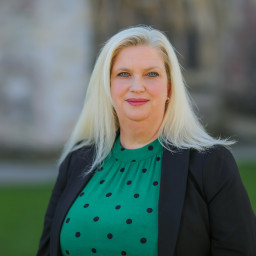Charity trustees are the people who share the ultimate responsibility for governing a charity.
Trustees ensure the charity is managed and run correctly. They may also be known as trustee volunteers, board members, management committee, governors, directors.
Trustees’ week is an annual event showcasing the great work trustees do as the often unsung heroes who volunteer their time, get involved and make a difference. As well as providing information on what it means to be a trustee, we have also asked our colleagues who are charity trustees about their role.
What is a trustee?
A trustee is usually a volunteer with big responsibilities, overseeing everything a charity does, from setting its strategy to being responsible for its work and finances.
What do trustees do?
In larger charities, trustees support and challenge the management team, but in smaller charities, they generally have more of a hands-on involvement. While they don't need specialist skills a good knowledge of finance, fundraising or IT helps, all trustees should bring a fresh perspective and commitment.
Depending on the size of the charity, trustees usually meet four to eight times a year, and between meetings, they should keep up-to-date with what’s going on in the organisation. While it does require commitment and involvement in the charity a trustee role can be extremely rewarding and valuable to the future of the charity.
What is it like to be a charity trustee? From the trustees at Tozers
James Evans, Tozers Partner & Solicitor and Head of Charity law, trustee for Mind Devon
Paul Kelly, Tozers Managing Partner & Solicitor and Head of Park law, trustee for Headway Devon
Vernon Clarke, Tozers Partner & Solicitor for Residential Property, trustee for Pilton Green Man
Stephen Jennings, Tozers Partner & Solicitor and Head of Employment law, trustee for Dawlish Gardens Trust
Clair Hemming, Tozers Partner & Solicitor in Medical Negligence, trustee for the Erb’s Palsy Group
Sue Halfyard, Tozers Partner and Chartered Legal Executive in Wealth Management, trustee for Alice Cross
Martin Laver, Tozers Partner & Solicitor in Commercial Litigation, trustee for the Museum of Policing in Devon & Cornwall
Mai Mbye, Solicitor in Employment Law, trustee for the Yvette Gate Trust
Helena Campbell, Associate and Chartered Legal Executive in Medical Negligence, trustee for Luna's Fund
What made you become a trustee, and why should someone consider becoming a trustee?
JE: I was keen to make a contribution to the wider community, where my skills and experience would hopefully be useful in supporting the work of a charity improving people’s lives. I also have a strong personal interest in mental health issues and so I was very keen to support the work of Devon Mind, a leading charity working in this field in my local region.
PK: I became a trustee because a former Tozers partner had a long-standing connection with the Headway group of charities. He told me about the important work they do. His example showed me the contribution that a professional trustee is able to make.
VC: I feel a duty to put something back into society – being a lawyer in Devon is a privileged position and it is an accident of fate that we are born into the families we are and had the chance of a good education so the least we can do is do something for others less fortunate and to try and make the world a better place.
SJ: A desire to be part of the local community in a positive way, not just someone who looks out for himself. I am privileged in many ways; it is only fair I should try to give something back.
CH: I specialise in acting for children and young adults who have suffered damage to the brachial plexus nerves during birth as a consequence of clinical negligence. Through this work I have a long standing relationship with the Erb’s Palsy Group, a charity who supports individuals who have suffered such injuries, and their families. The Erb’s Palsy Group is a small charity with limited funds and is run entirely by volunteers. Despite funding limitations, and time constraints, the support the Charity offers and the work they do to raise awareness, train medical professionals and improve aftercare is fantastic. The work that the EPG does makes such a difference. I wanted to do more to help and hoped that my experience and knowledge would be of benefit to the Charity.
SH: Tozers were approached by the Charity as they were looking for new trustees as I work in the private client sector it felt appropriate that I may be the correct person to take on this role and help the Charity to help the local community
ML: As a lawyer, I am conscious that there are many charitable organisations who need legal input into the running of the organisation but who cannot necessarily afford to retain a lawyer to do so. Being involved in the oversight of a charitable organisation also helps me build my own skills and learn new things in new areas.
MM: I became a trustee to honour the legacy of my friend, Yvette Gate, whose journey inspired the charity’s mission. Yvette needed a bone marrow transplant, which highlighted the urgent need for more Afro-Caribbean donors, as finding a suitable match is especially challenging within underrepresented communities. Being part of the trust is a way to carry forward Yvette’s story and our shared mission of increasing awareness and encouraging more people to register as stem cell donors. For anyone passionate about a cause, being a trustee is an incredible way to influence positive change.
HC: I became a trustee for Veterans With Dogs in 2016, progressing to Chair on the Board of trustees until 2024. Being able to support the charity, expanding and re-working the board, was extremely rewarding. Seeing the growth of the charity, and the number of veterans being enabled to live independent lives with the support of assistance dogs was a privilege. There was also the added benefit of playing with puppies and watching them thrive!
Working in the medical negligence team, I worked closely with Luna’s Fund in supporting those parents affected by avoidable baby loss and neonatal death. The CEO kindly invited me to join the board of trustees in March 2024, with the view of expanding the knowledge on the board. Seeing the growth of the charity in a short space of time is exceptionally rewarding.
To commit time, you must feel passionate about the cause. Once you’ve found that passion, providing background support as a trustee is incredibly fulfilling.
What do you enjoy about being a trustee?
JE: Being able to contribute to the charity’s strategic decision-making, working together with fellow trustees and the charity’s staff team in relation to a cause I feel passionate about
PK: I enjoy working alongside people who are not lawyers, and seeing how we combine our different skills to support such important work.
VC: Not the meetings (!) but the camaraderie of working towards a common purpose with like minded people.
SJ: The chance to apply my skills towards an entirely worthwhile cause working with like-minded people, all of whom are happy to give up time to benefit the local community. Plus being able to give legal advice without having to time-record!
CH: There are many aspects because it is so varied. Being a small charity it is literately all hands on deck, and we all do whatever task is needed. I have written articles for the newsletter, and letters asking for donations but also made sandwiches for an outreach meeting, and swept floors. It is a great leveller - seeing people from all walks of life pulling together, doing what is needed.
SH: Working with the other trustees to try to improve the facilities we can make available for the local community. Whether this is providing them with a hot meal or getting people involved in the classes we offer.
ML: Being able to help. Meeting new people from different walks of life. Maintaining a connection to things you care about.
MM: Being able to work with other individuals towards a shared goal and making a positive impact on the community.
HC: I enjoy knowing that I am able to support the cause, the CEO and the board generally, watching the charity grow, and seeing such a tangible benefit.
What is a highlight of being a trustee?
JE: Being able to understand firsthand the fantastic work Devon Mind does to support the needs of the community and feeling part of the team that makes that happen.
PK: The highlight is hearing how the organisation has made a difference, and sometimes thinking you have played a small part.
VC: Knowing you have made some small difference for the better.
SJ: Feeling that I am contributing to a charity which makes a really direct and positive difference and helps bring joy to many lives.
CH: The Charity runs many events over the year – fundraising, training, networking and support meetings. I therefore have the opportunity to travel all over the Country for these events, and visit places that I might not otherwise see. I also meet lots of different people, including truly inspirational young people with Erb’s Palsy who have overcome their disability, and also very eminent medical professionals at the very top of their field. There is also a real social aspect to the role as well. The Board of Trustees and wider Erb’s Palsy Group community are like an extended family.
SH: Being able to offer support to people in the community during the recent lockdowns to ensure that people had a hot meals, their medication delivered or simply someone to talk to.
ML: Helping an organisation to do something it would have found difficult to do without you.
MM: Being able to raise awareness and knowing that our efforts may lead to more lives being saved through increased donor registrations.
HC: Supporting the users of the charity and witnessing their progress.
What do you get out of being a trustee?
JE: It is a genuinely rewarding experience to be part of an organisation which makes a real difference to people’s lives. As a lawyer specialising in working with charities, having direct charity board experience also gives me a deeper understanding of the wider issues charities face which in turn helps me provide more rounded legal support to the organisations I work with.
PK: The challenges faced by charities at the moment, and sometimes by their clients, help keep life in perspective. Working in a different organisation can give you some interesting ideas.
VC: A sense of satisfaction (sometimes) although can also be frustrating experience on occasions.
SJ: Perspective (and chocolate biscuits).
CH: Being able to “give something back” or “make a difference” sounds trite but it really does sum it up. Helping someone else without any intended personal gain is hugely satisfying and this is just on a larger scale. But in fact we are simply sharing our different skills and I believe that we do benefit from that also on a personal level.
SH: The knowledge that I am doing my bit to help the community.
ML: A greater sense of community and being part of something important. Meeting new people. Learning new skills. Applying your skills and developing them. Occasionally, a chocolate biscuit…
MM: Pride in honouring my friend’s legacy and being able to raise awareness, making positive changes.
HC: I get to watch the charity grow and see people benefit from the services that the charity provide.
Would you recommend becoming a trustee?
JE: Definitely. Many charities have an urgent need for additional trustees with the skills and experience they need, as well as having greater diversity on their boards, and I would encourage anyone who has the capacity to take on a trustee role to do so.
PK: I would recommend that anybody considers becoming a trustee, providing their commitments allow them to do so. Doing the job properly can be hard work, but it’s great to feel that you are contributing.
VC: Definitely – there is shortage of trustees and too many people sit on their hands and leave it to others to do.
SJ: Absolutely! But if you take the plunge then do it whole-heartedly – being a trustee is an incredibly rewarding privilege.
CH: Yes, I would without hesitation, as it is very rewarding for the reasons I have given above. However what is most important is that you are realistic about what you are able to offer and the time you can dedicate. A charity which is run on an entirely voluntary basis needs dedicated but also reliable people.
SH: I would but, I would be lying to say that it does not take some effort and time commitment.
ML: Definitely. It is important for us all to use our own skills and knowledge to help others, particularly those who could not otherwise afford to do so.
MM: Absolutely! It’s a unique opportunity to give back and it also allows you to develop new skills.
HC: To become a trustee takes time and considerable effort. But, the reward of helping others and having the opportunity to support a charity with your own skillset, is ultimately fulfilling.
Find out more
For further information about how our dedicated Charities lawyers can help, contact them today, or visit their hub page.





